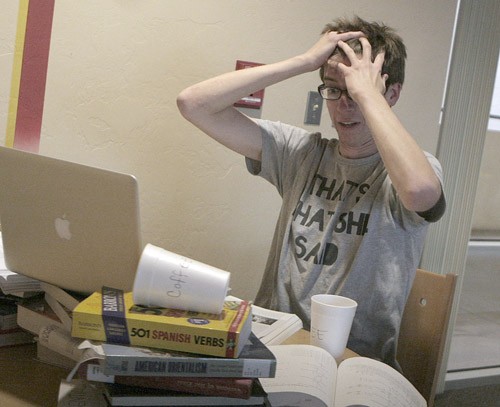Stress is a buzzword on campus during the last few weeks of classes. Between homework, preparing for final exams and planning for summer, it may be difficult for students to manage their stress or determine how much is too much.
Marian Binder, clinical psychologist and director of Campus Health’s Counseling and Psychological Services, said stress is to be expected at the end of the school year.
Students frequently use CAPS services during exam time, according to Krishna Bright, a mental health clinician for CAPS.
“”This is the busiest time of the year for sure,”” Bright said.
Students who are paralyzed by stress and thus unable to function may face something more serious.
“”When I would be concerned is if a student was experiencing stress already, and when exam time approached they were unable to do their work,”” Binder said.
Binder points to an inability to function normally as an indicator that a student may need professional help. Extreme irritability and anxiety that are “”more than episodic”” are also warning signs, according to Binder.
“”You’d have to look at the severity of stress and how long it lasted,”” Binder said. “”If this is one day, that’s one thing. But if this goes on day after day, that’s something else.””
CAPS offers counseling for students facing severe or chronic stress.
Even students facing “”normal”” finals week stress may find the services offered by CAPS beneficial.
“”Anybody who’s experiencing stress at any time (for) any reason can always visit CAPS,”” Binder said. “”People can come to CAPS to get a handle on what’s contributing to their stress.””
Counselors at CAPS can offer students techniques to reduce anxiety and often recommend “”relieving stress through exercise or relaxation,”” Bright said.
Sociology junior Josh Fenster said he is already feeling the effects of finals stress.
“”It’s certainly heightened,”” Fenster said of his stress level. “”I really have to cram these last two weeks.””
When students are busy studying, healthy living can go by the wayside.
“”Sometimes what looks like stress about finals is actually a problem handling other issues in life,”” Binder said. “”Other things that impact physical well-being can appear like stress.””
Fenster said his hectic schedule affects his eating and sleeping habits.
“”I sleep less. I eat at weird hours. It’s just all over the place,”” Fenster said.
Students may falsely blame stress for symptoms attributable to other issues.
Students who pull all-nighters studying may have difficulty concentrating and feel nervous. These symptoms directly correlate to a lack of sleep.
Students looking for a late-night “”boost”” may turn to coffee or sugar, both of which can make people jittery.
“”They may actually be doing themselves a disservice,”” Binder said of students trying to power through a study session. “”Sometimes when you try to approach things in extreme ways, it backfires.””
Binder recommends balance as the key to reducing stress and unhealthy choices.
“”You want to get as much balance as you can between sleep, exercise, nutrition and study time,”” Binder said.
Fenster combats his stress by going to bed by 12:30 a.m. to avoid a “”tired hangover.”” He said he does not feel the need to seek professional help.
“”I didn’t even know there were services,”” Fenster said. “”I like the system I have. If (CAPS) was more visible, I might have thought about it earlier.””
Political science senior Damaris Cuen finds that preventing stress is easier than treating it.
“”I think I’m ready to take finals,”” Cuen said. “”So far, I’m not stressed because I know what’s coming up.””
Cuen said she studies in moderation and tries to avoid cramming.
“”Do as much as you can and be confident that you’ll do fine,”” Cuen said.
CAPS will offer its final wellness walk May 5 for students looking to relieve stress.









